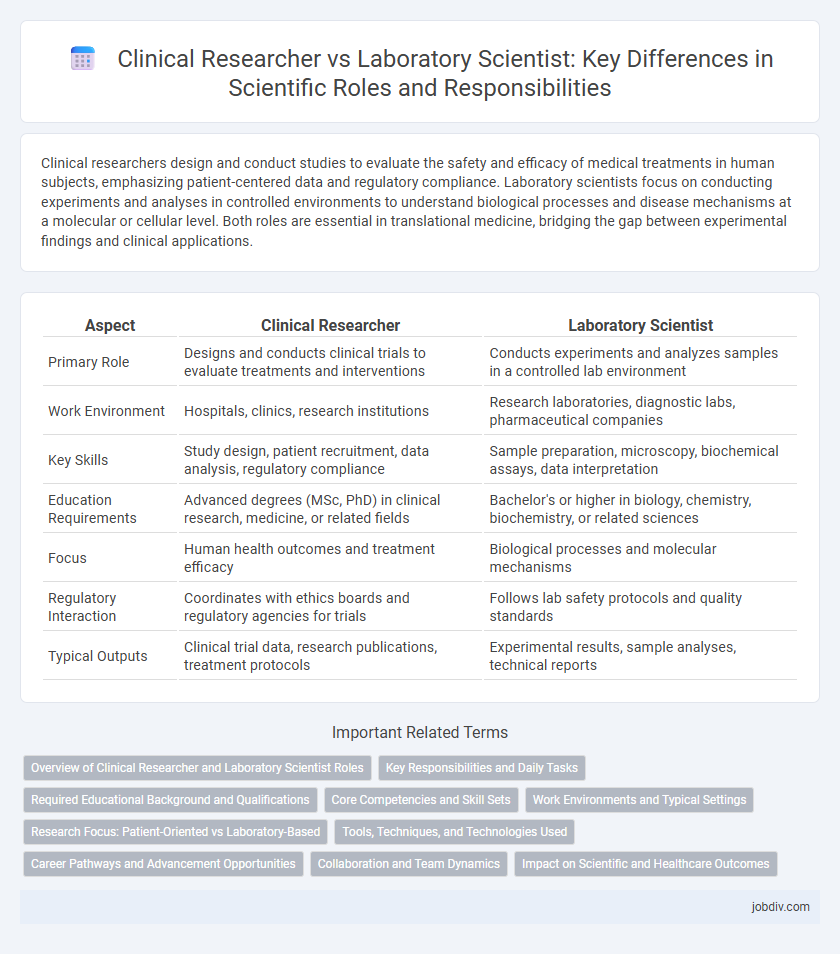Clinical researchers design and conduct studies to evaluate the safety and efficacy of medical treatments in human subjects, emphasizing patient-centered data and regulatory compliance. Laboratory scientists focus on conducting experiments and analyses in controlled environments to understand biological processes and disease mechanisms at a molecular or cellular level. Both roles are essential in translational medicine, bridging the gap between experimental findings and clinical applications.
Table of Comparison
| Aspect | Clinical Researcher | Laboratory Scientist |
|---|---|---|
| Primary Role | Designs and conducts clinical trials to evaluate treatments and interventions | Conducts experiments and analyzes samples in a controlled lab environment |
| Work Environment | Hospitals, clinics, research institutions | Research laboratories, diagnostic labs, pharmaceutical companies |
| Key Skills | Study design, patient recruitment, data analysis, regulatory compliance | Sample preparation, microscopy, biochemical assays, data interpretation |
| Education Requirements | Advanced degrees (MSc, PhD) in clinical research, medicine, or related fields | Bachelor's or higher in biology, chemistry, biochemistry, or related sciences |
| Focus | Human health outcomes and treatment efficacy | Biological processes and molecular mechanisms |
| Regulatory Interaction | Coordinates with ethics boards and regulatory agencies for trials | Follows lab safety protocols and quality standards |
| Typical Outputs | Clinical trial data, research publications, treatment protocols | Experimental results, sample analyses, technical reports |
Overview of Clinical Researcher and Laboratory Scientist Roles
Clinical researchers design and conduct clinical trials to evaluate new medical treatments, ensuring compliance with regulatory standards and ethical guidelines. Laboratory scientists analyze biological samples and perform diagnostic tests to support clinical decisions and advance biomedical knowledge. Both roles require strong analytical skills, but clinical researchers focus on patient-oriented studies while laboratory scientists emphasize experimental and diagnostic techniques.
Key Responsibilities and Daily Tasks
Clinical researchers design and conduct human trials to evaluate the safety and efficacy of new medical treatments, analyze patient data, and ensure compliance with regulatory standards. Laboratory scientists perform experiments, manage laboratory equipment, and analyze biological samples to support research and diagnostics. Both roles require meticulous data documentation, but clinical researchers focus more on patient interaction and clinical protocol adherence, while laboratory scientists emphasize technical procedures and sample analysis.
Required Educational Background and Qualifications
Clinical researchers typically require a doctoral degree such as an MD or PhD in fields like clinical medicine, public health, or biomedical sciences, along with specialized training in clinical trial design and regulatory compliance. Laboratory scientists generally hold at least a bachelor's degree in disciplines such as biology, chemistry, or medical laboratory technology, with many pursuing advanced degrees like a master's or PhD for research-intensive roles. Certifications such as Certified Clinical Research Professional (CCRP) for clinical researchers and Medical Laboratory Scientist (MLS) certification for laboratory scientists enhance professional credibility and are often necessary for career advancement.
Core Competencies and Skill Sets
Clinical researchers excel in trial design, patient interaction, regulatory compliance, and data analysis to evaluate medical interventions, while laboratory scientists specialize in experimental techniques, sample processing, molecular biology, and maintaining laboratory equipment for accurate diagnostic results. Core competencies for clinical researchers emphasize biostatistics, clinical protocols, and ethical considerations, whereas laboratory scientists prioritize technical proficiency, precision, and troubleshooting complex assays. Both roles require strong analytical skills, but clinical researchers focus more on patient-centered outcomes and study management, and laboratory scientists concentrate on experimental validation and data integrity.
Work Environments and Typical Settings
Clinical researchers primarily work in hospital settings, academic institutions, or pharmaceutical companies, engaging in patient-based studies and clinical trials that demand a controlled and regulatory-compliant environment. Laboratory scientists operate mainly in specialized labs within research centers, diagnostic laboratories, or biotech firms, focusing on experimental procedures, sample analysis, and data generation under strict laboratory protocols. Both professions require adherence to safety standards, but clinical researchers are more frequently involved in direct patient interactions, whereas laboratory scientists emphasize technical laboratory work.
Research Focus: Patient-Oriented vs Laboratory-Based
Clinical researchers primarily concentrate on patient-oriented studies, investigating disease progression, treatment efficacy, and patient outcomes through clinical trials and observational research. Laboratory scientists focus on laboratory-based research, conducting experiments to understand molecular mechanisms, cellular functions, and biochemical pathways underlying diseases. Both roles are essential for translating laboratory findings into clinical applications, bridging the gap between bench science and patient care.
Tools, Techniques, and Technologies Used
Clinical researchers utilize electronic data capture systems, statistical software such as SAS or R, and patient monitoring devices to conduct trials and analyze clinical outcomes. Laboratory scientists employ advanced microscopy, chromatography, spectrometry, and molecular biology tools like PCR machines to investigate biochemical and cellular processes. Both roles integrate cutting-edge technologies such as automation platforms and bioinformatics to enhance accuracy and efficiency in data acquisition and analysis.
Career Pathways and Advancement Opportunities
Clinical researchers primarily engage in designing and overseeing human trials to evaluate new treatments, often advancing into roles such as principal investigators or clinical project managers. Laboratory scientists specialize in analyzing biological samples and conducting experiments, with career growth typically leading to senior scientist or laboratory director positions. Both career paths offer opportunities for specialization, leadership roles, and contributions to scientific innovation within healthcare and pharmaceutical industries.
Collaboration and Team Dynamics
Clinical researchers and laboratory scientists collaborate closely to bridge patient-focused studies with experimental data, enhancing the accuracy and relevance of scientific findings. Effective team dynamics rely on clear communication, shared goals, and mutual respect for each professional's expertise in study design, data collection, and analysis. Integrating clinical insights with laboratory results accelerates translational research, fostering innovations in diagnostics and therapeutics.
Impact on Scientific and Healthcare Outcomes
Clinical researchers drive medical advancements by designing and conducting trials that validate new treatments, directly influencing patient care protocols and healthcare policies. Laboratory scientists provide foundational data through experimental analysis, enabling precise diagnostics and the development of novel therapeutics. Together, their collaborative efforts accelerate translational medicine, optimizing healthcare outcomes and fostering evidence-based practices.
Clinical Researcher vs Laboratory Scientist Infographic

 jobdiv.com
jobdiv.com